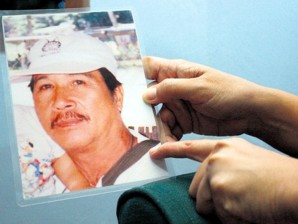
NO CLOSURE Reynafe Momay-Castillo points to a picture of her father, Reynaldo, a photographer for Midland Review, who remains missing to this day. JEOFFREY MAITEM/INQUIRER MINDANAO
ISULAN, Sultan Kudarat—Like the memories of the grisly crime that shocked the world two years ago, the grief lingers for Maria Reynafe Momay-Castillo.
“Who would not?” she asked, caressing the lone clear photo of her father, Reynaldo Momay, a 61-year-old photojournalist of the weekly community paper Midland Review.
“When the body of your father is out there, never recovered, this will bring us misery, forever,” she said.
A convoy of 58 people, including 33 media workers on their way to file candidacy papers for then Buluan Vice Mayor Esmael Mangudadatu to rival Andal Ampataun Jr., scion of a family that has long dominated the strife-torn province of Maguindanao, was gunned down in an idle village far off the main road on Nov. 23, 2009.
After the slaughter, families scrambled over the victims’ putrid bodies in the disorder at the funeral homes. Castillo instantly recognized what she thought was her father’s decaying form through a red jacket and the shoes he wore the day they parted. But that was not him as one family claimant said.
“We have strong evidence that he was with the convoy—ID card, dentures,” she said. “His body was never found but only if they dug deeper in the grave site where they dumped the bodies, my father could be there somewhere.”
Nowhere man
Momay’s remains have not been found. “They did not count him among the victims in legal proceedings of the case,” his daughter said.
The family is often asked for a death certificate to authenticate claims and financial aid from the government.
Trying hard to stifle tears, she recounted how she bade farewell to him for a coverage of Mangudadatu’s bid for the governorship. “The kids … mind them,” were his parting words to her.
“He was extra caring, thoughtful for a father and I found it very unusual,” Castillo said of the father she nearly lost when she was only 6 months after he abandoned them for another woman.
Rekindled relation
The relationship was revived when she was 5 years old and she started asking her mother for a father’s love. The two were introduced and she had since spent summers at his home in Tacurong City.
“He doted on me, showed me love. Those were memories I will hold close to my heart forever. I miss him terribly,” Castillo said.
With the chilling weight of two years of search for the body, Castillo, her husband and two teenage sons RJ and Ralph, only pin their hopes on the prosecution of the Ampatuans, who witnesses claimed masterminded the butchery.
Understanding how the case has dragged, Castillo has her hands full, quietly monitoring its pace along with the distraught relatives of the other massacre victims. Members of Justice Now Movement, which they created after the murders, used to attend the court hearing every two weeks.
Castillo, treasurer of the group funded by National Union of Journalists in the Philippines, lamented the slow court proceedings held thrice a week on Mondays, Wednesdays and Thursdays.
“Imagine a witness stands in court for two weeks—the cross-examination, re-cross, another cross—these are painful for the families awaiting justice,” she said.
“The same witnesses are heard over and over,” she said.
They have since been reduced to watching the court case on TV at home or checking with prosecution lawyers.